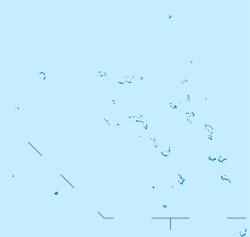Roi-Namur
Roi–Namur Battlefield | |
U.S. National Register of Historic Places | |
U.S. National Historic Landmark District | |
 | |
| Location | Kwajalein Missile Range, Kwajalein Atoll |
|---|---|
| Coordinates | 9°23′46″N 167°28′33″E / 9.39611°N 167.47583°E / 9.39611; 167.47583Coordinates: 9°23′46″N 167°28′33″E / 9.39611°N 167.47583°E / 9.39611; 167.47583 |
| Built | 1944 |
| NRHP reference # | 85001758 |
| Significant dates | |
| Added to NRHP | February 4, 1985[1] |
| Designated NHLD | February 4, 1985[2] |
Roi-Namur (/ˌrɔɪ nəˈmʊər/) is an island in the north part of the Kwajalein Atoll in the Marshall Islands. Today it is a major part of the Ronald Reagan Ballistic Missile Defense Test Site, hosting several radar systems used for tracking and characterizing missile reentry vehicles (RV) and their penetration aids (penaids).
Contents
1 History
2 Today
3 See also
4 References
History
Germany annexed the Marshalls in 1885 but did not put government officials on the islands until 1906, leaving island affairs to a group of powerful German trading companies. Under the Treaty of Versailles, Japan took over after World War I. They colonised the Marshalls extensively, developing and fortifying large bases on many of the islands.
Roi-Namur was the target of the U.S. 4th Marine Division in the Battle of Kwajalein, in February 1944. During the Japanese occupation, the two islands (Roi to the west (Marshallese: Ruot, [rʷuɔ͡ʌtˠ]) and Namur to the east (Nim̧ur, [nʲi͡ɯmˠɯ͡urʷ])) were connected by a narrow neck of land and causeway. After the American occupation, US Navy SeaBees filled the area between the islands by December 1944; the two now joined islands are presently called Roi-Namur with a total area of about one square mile.
Roi-Namur was selected by DARPA as a host site for a series of radar experiments under the Project Defender umbrella, and Project PRESS in particular. These experiments intended to use radar means to distinguish an enemy RV from its penaids though the examination of the size, shape and velocity of the objects, as well as examining the wake they left in the upper atmosphere. By building on Roi-Namur, they were able to use the test shots being used by the US Army's Nike-X program installed on Kwajalein Island and Meck Island further to the south.
Today
Roi-Namur is home to an about 120 American and Marshallese employees of the Reagan Test Site.
The Roi side is the main housing area, with the retail and recreation facilities there. Activities on Roi-Namur range from a nine-hole golf course, saltwater swimming pool, scuba club, movie theater, volleyball, and basketball court. Roi hosts the Freeflight International Airport (Marshall Islands) with one runway for small planes that commute from Kwajalein bringing additional workers. Additional Marshallese daytime workers come via ferry from the island of Enniburr.
The Namur side is home to the ALCOR, ALTAIR, MMW and TRADEX radar tracking stations.
There is a small launch facility on Roi-Namur. Rockets launched here are usually sounding rockets that ascend beyond the atmosphere but have short ranges. There are crumbling remnants of Japanese blockhouses and pillboxes around Roi-Namur.
Map of Roi-Namur during World War II. The causeway is roughly centered.

ALTAIR radar
See also
- List of United States National Historic Landmarks in United States commonwealths and territories, associated states, and foreign states
- National Register of Historic Places listings in the Marshall Islands
References
^ National Park Service (2008-04-15). "National Register Information System". National Register of Historic Places. National Park Service..mw-parser-output cite.citation{font-style:inherit}.mw-parser-output q{quotes:"""""""'""'"}.mw-parser-output code.cs1-code{color:inherit;background:inherit;border:inherit;padding:inherit}.mw-parser-output .cs1-lock-free a{background:url("//upload.wikimedia.org/wikipedia/commons/thumb/6/65/Lock-green.svg/9px-Lock-green.svg.png")no-repeat;background-position:right .1em center}.mw-parser-output .cs1-lock-limited a,.mw-parser-output .cs1-lock-registration a{background:url("//upload.wikimedia.org/wikipedia/commons/thumb/d/d6/Lock-gray-alt-2.svg/9px-Lock-gray-alt-2.svg.png")no-repeat;background-position:right .1em center}.mw-parser-output .cs1-lock-subscription a{background:url("//upload.wikimedia.org/wikipedia/commons/thumb/a/aa/Lock-red-alt-2.svg/9px-Lock-red-alt-2.svg.png")no-repeat;background-position:right .1em center}.mw-parser-output .cs1-subscription,.mw-parser-output .cs1-registration{color:#555}.mw-parser-output .cs1-subscription span,.mw-parser-output .cs1-registration span{border-bottom:1px dotted;cursor:help}.mw-parser-output .cs1-hidden-error{display:none;font-size:100%}.mw-parser-output .cs1-visible-error{font-size:100%}.mw-parser-output .cs1-subscription,.mw-parser-output .cs1-registration,.mw-parser-output .cs1-format{font-size:95%}.mw-parser-output .cs1-kern-left,.mw-parser-output .cs1-kern-wl-left{padding-left:0.2em}.mw-parser-output .cs1-kern-right,.mw-parser-output .cs1-kern-wl-right{padding-right:0.2em}
^ "Roi-Namur". National Historic Landmark summary listing. National Park Service. Archived from the original on 2012-10-07. Retrieved 2007-06-28.
This Marshall Islands location article is a stub. You can help Wikipedia by expanding it. |

